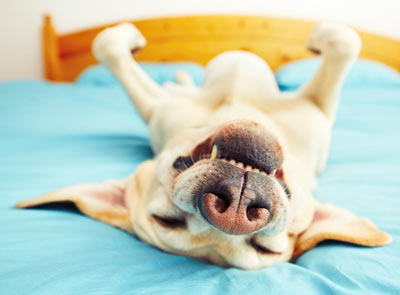Let Sleeping Dogs Lie and They'll Learn Better

A new study has revealed a better way to train dogs, and it doesn't require learning any new techniques or buying state-of-the-art equipment.
It just requires a nap.
Sleeping May Cement Long-Term Memories in Dogs
Most of the sleep research done in the past has been conducted on humans and rodents. Because there is a large variation in sleep habits between species, there may be differences in what sleep is used for.
It's widely thought by psychologists that sleep and memory are intertwined in humans, with sleep allowing short-term memories to be consolidated and transformed into long-term memory.
Researchers recently conducted a series of tests in dogs to determine the effects of sleep on training.
The study worked like this:
First, 15 dogs were divided into 2 different groups. Dogs in the first group were taught some new commands in English. They already knew the same commands in Hungarian. The second group of dogs just practiced the commands they already knew in Hungarian rather than learning anything new. EEG recordings were taken of all the dogs' brain activity during the training sessions.
Next, the dogs were allowed to nap for 3 hours, during which their brain activity was also recorded via EEG. The dogs that had learned new commands in English during the training sessions had significantly different brain activity while they slept than the dogs that hadn't been taught anything new. When they woke up, the dogs that had learned new commands were asked to perform them again, and they did better than they had done prior to sleeping.
For the second phase of the study, a group of 53 dogs were divided into 4 smaller groups. The dogs were all trained to learn new commands in English. Afterward, each of the 4 groups did a different activity: sleeping, walking, playing with a Kong toy, or more training.
After an hour of the second activity, dogs were asked to follow the newly learned English commands again. All of the dogs did better except those that had more training during the hour after the initial training. Dogs that played with a Kong did a bit better but not as well as dogs that walked or slept in the hour after the initial training session.
Conclusion: How to Make Your Dog Training Stick
When you are training your dog to do something new, it's probably best to stick to short training sessions followed by a period of "rest." That rest may be anything that isn't related to learning something new, but exercise and sleep seem to have the greatest positive effects on retention.
Rest periods after training seems to allow a dog's brain to transfer the newly made short-term memories related to the training session into long-term memories.
If you would like to train your dog using a Kong toy or just want to give him hours of fun play, you can buy a Kong toy here.
Works Cited
- Anna Kis, S. S. (2017, Feb. 6). The interrelated effect of sleep and learning in dogs (Canis familiaris); an EEG and behavioural study. Retrieved from nature.com: DOI: 10.1038/srep41873.
You May Also Like These Articles:
Old Dog, New Tricks: How to Socialize an Older Dog
How to Manage Your Dog's Over-The-Top Greetings
Is My Dog Normal? 15 Dog Behaviors Explained - Slideshow
Why Do Dogs Tilt Their Heads When You Talk?
Disclaimer: This website is not intended to replace professional consultation, diagnosis, or treatment by a licensed veterinarian. If you require any veterinary related advice, contact your veterinarian promptly. Information at DogHealth.com is exclusively of a general reference nature. Do not disregard veterinary advice or delay treatment as a result of accessing information at this site. Just Answer is an external service not affiliated with DogHealth.com.
Notice: Ask-a-Vet is an affiliated service for those who wish to speak with a veterinary professional about their pet's specific condition. Initially, a bot will ask questions to determine the general nature of your concern. Then, you will be transferred to a human. There is a charge for the service if you choose to connect to a veterinarian. Ask-a-Vet is not manned by the staff or owners of DogHealth.com, and the advice given should not delay or replace a visit to your veterinarian.



